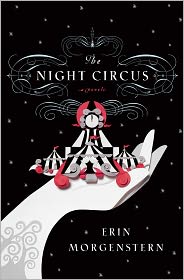The Night Circus
by Erin Morgenstern
If there is magic, in the world as I know it, it is found in the pages of books. And Erin Morgenstern’s debut novel, The Night Circus, is the most magical, transporting experience I’ve had in quite some time. It opens in 1873, backstage in a New York theater with these words, “The man billed as Prospero the Enchanter receives a fair amount of correspondence via the theater office, but this is the first envelope addressed to him that contains a suicide note, and it is also the first to arrive carefully pinned to the coat of a five-year-old girl.” And so it is that Hector Bowen learns of the existence of his daughter, Celia. Hector’s response to his change in circumstances is unenthusiastic, but he soon discovers that Celia is a chip off the old block. You see, Hector only pretends to be an illusionist on stage. The magic he practices is entirely real—and Celia has inherited talent.
Hector is not content to merely mentor his daughter. He contacts his associate, Mr. A. H— about a wager. A deal is struck, after which that gentleman returns to London and adopts a protégé of his own, the orphaned Marco. These two young people are raised unconventionally, studying magic under their tutors’ philosophies, all the while knowing there will be a competition between the two of them some day. Enter impresario Chandresh Lefèvre, who has imagined something wondrous. He explains:
“More than a circus, really, like no circus anyone has ever seen. Not a single large tent but a multitude of tents, each with a particular exhibition. No elephants or clowns. No, something more refined than that. Nothing commonplace. This will be different, this will be an utterly unique experience, a feast for the senses. Theatrics sans theater, an immersive entertainment. We will destroy the presumptions and preconceived notions of what a circus is and make it something else entirely, something new.”
And so the venue for the magical competition between Celia and Marco is born. And there you have the bare bones of Ms. Morgenstern’s story. There’s no need to tell more. The magic of this tale is in the language and the characters and in Ms. Morgenstern’s infinitely rich, romantic imagination.
The circus, it is said, “arrives without warning.” Not so this novel. There have been all kinds of pre-pub buzz and hype for this title. There’s a reason; this book is so special that almost all who read it take note. Ms. Morgenstern’s tale transcended the page and brought true enchantment to my oh-so-ordinary life. As it happens, one of the characters could be speaking for the author herself:
“I find I think of myself not as a writer so much as someone who provides a gateway, a tangential route for readers to reach the circus. To visit the circus again, if only in their minds, when they are unable to attend it physically. I relay it through printed words on crumpled newsprint, words they can read again and again, returning to the circus whenever they wish, regardless of time of day or physical location. Transporting them at will.
When put that way, it sounds rather like magic, doesn’t it?”
Oh yes, it does! And I expect to be returning to this circus for many years to come.


Sounds fantastic! I love the trailer.
ReplyDeleteIt does have a certain elegance, doesn't it?
ReplyDelete